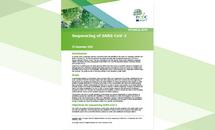Evaluation of the SARS-CoV-2 testing policy in Belgium from June to December 2021
The aim of this report is to independently evaluate the Belgian SARS-CoV-2 testing policy to support an optimal and sustainable testing policy for public health purposes. The objectives of the evaluation were to assess the testing policy in Belgium with regards to diagnosis of COVID-19 to identify cases and guide the prevention and control of transmission; testing for COVID-19 to monitor COVID-19 incidence and trends; screening for COVID-19 to identify clusters and mitigate their impact on healthcare and other high-risk settings; and genomic surveillance of SARS-CoV-2 and detection of variants.
Executive Summary
Testing strategies were first decided upon in Belgium by existing institutions, but during the crisis, other bodies were set up. The Belgian testing strategies were developed based on scientific advice and have regularly been adapted, with indications for testing, based on the epidemiological situation. The policies are put into operation through a strong mechanism of concertation and coordination involving all political levels in Belgium as well as, where needed, representatives of field actors. The case definitions used are aligned with those of ECDC.
Belgian Authorities have invested efforts to significantly increase SARS-CoV-2 testing capacities, both by means of reverse transcription polymerase chain reaction (RT-PCR) and rapid antigen detection tests (RADT); self-administrated RADT have been recently introduced for specific circumstances.
Efforts are ongoing in Belgium for the deployment of a comprehensive syndromic surveillance system. The objective is to adapt existing sentinel surveillance networks for respiratory infections in order to include syndromic surveillance of COVID-19 and testing of SARS-CoV-2. Syndromic surveillance at the level of GPs, emergency departments and intensive care units are considered as initial priorities.
Belgium follows a broad testing strategy, with a defined order of priority outlined for different epidemic scenarios. The strategy prioritises the testing of vulnerable individuals, as well as those in high-risk settings, including healthcare workers and those in close contact with vulnerable people.
Belgium performs comprehensive genomic surveillance and sequences are reported weekly, with volumes sufficient to estimate variant proportions of 2.5% or lower, following ECDC recommendations.
Download






